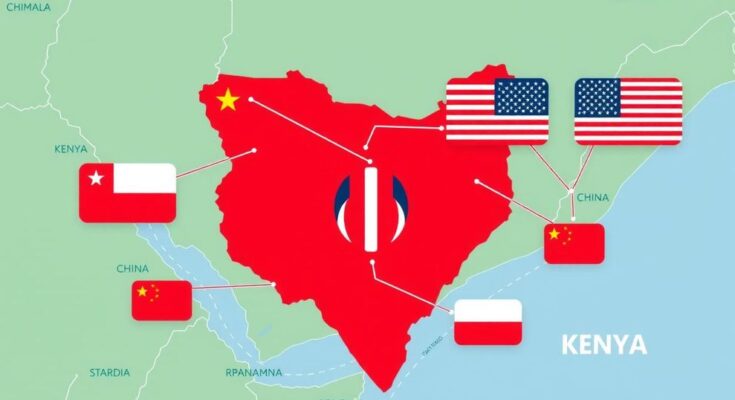U.S. Secretary of State Marco Rubio canceled his scheduled visit to Kenya due to rising concerns over Kenya’s relationship with China, corruption issues, and ties to regional rebel groups. This follows President Ruto’s recent visit to China and raises questions about U.S.-Kenya relations amidst a broader diplomatic shift.
The visit of U.S. Secretary of State Marco Rubio to Kenya, originally scheduled for next week, has been canceled. This move has raised eyebrows and speculation regarding its connection to Kenya’s strengthening relationship with China, recent corruption scandals, and its controversial ties with rebel groups in the Democratic Republic of Congo and Sudan. Sources close to the situation indicate that these factors have influenced the abrupt decision.
Rubio was meant to be in Nairobi on April 28 as part of his inaugural diplomatic tour in Africa, marking his first visit since being appointed by President Donald Trump earlier this year. The itinerary also included a stop in Ethiopia. However, with just days to go, officials from Washington confirmed that the trip would not be taking place, but they did not provide an official reason for the cancellation.
This decision follows closely on the heels of Kenyan President William Ruto’s five-day state visit to China, which ended shortly before the announcement. Ruto met with notable Chinese leaders, including President Xi Jinping and Premier Li Qiang, to discuss strengthening trade, investment, and infrastructure ties. This visit has stirred concerns in Washington as Ruto emphasized Kenya’s role as China’s lead partner in the Belt and Road Initiative.
In a notable turn during his China trip, Ruto condemned Russia’s invasion of Ukraine and criticized a recent U.S. vote at the United Nations Security Council that echoed Russian interests. Such actions have contributed to the growing unease between Nairobi and Washington, raising eyebrows about Kenya’s foreign policy direction.
Further complicating matters is Kenya’s decision to host Sudan’s Rapid Support Forces in Nairobi and alleged backing of rebel groups in Eastern DRC. U.S. diplomats have expressed frustration with the Ruto administration’s approach to regional stability, putting a strain on diplomatic relations.
The cancellation of Rubio’s visit comes amidst broader reports that the Trump administration is contemplating closing several U.S. embassies and consulates globally, including multiple locations in Africa. This could potentially impact U.S.-Kenya relations even more significantly.
During a recent press briefing, Troy Fitrell, a senior State Department official for Africa, stated that U.S. diplomats are now focused on supporting American businesses and investment opportunities in Africa. However, sources noted that many U.S. companies have withdrawn their commitment to significant investments in Kenya, pointing to increasing corruption as a factor. This has resulted in substantial financial losses for Kenya, as opportunities that were anticipated post-Ruto’s White House visit are now in jeopardy.
Moreover, the shutdown of the U.S. Agency for International Development (USAID) in Kenya signals a notable shift in U.S. policy toward the nation, further straining bilateral relations.
Currently, the Kenyan government has remained silent regarding the cancellation, but social media criticisms are emerging. Some citizens question the timing of Ruto’s recent trip to China, suggesting poor judgment amid rising U.S.-China tensions. As one commentator remarked, “President Ruto chose the worst time to visit China—during heightened U.S.-China tensions over tariffs.”
The Deputy Governor of Machakos, Francis Mwangangi, also remarked that Rubio’s cancellation is likely linked to rising concerns over corruption and Kenya’s ties with regional rebel groups.
In summary, the cancellation of Secretary Rubio’s visit to Kenya reflects escalating tensions between the U.S. and Kenya, compounded by the latter’s strengthening ties with China and ongoing corruption issues. The recent cancellation, alongside Kenya’s controversial hospitality towards rebel groups and diminishing investment interest from U.S. firms, may signal a significant shift in diplomatic relations, underscoring an increasingly complicated geopolitical landscape. Moreover, the closure of USAID could further strain ties. The Kenyan government’s response remains to be seen as public scrutiny mounts.
Original Source: hornobserver.com




